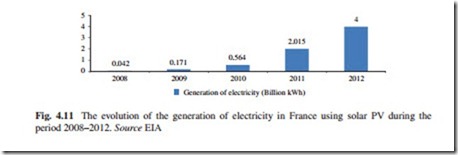France
France is a nation that has traditionally been somewhat insulated from the need to purchase fossil fuels due to a strong nuclear power generation capability. Recent pressures on the increase use of cleaner energy and energy price11 have given rise to a host of subsidies and policies designed to encourage a shift of energy production from conventional to renewable. One area in which the French has invested heavily is in solar energy. French subsidies have facilitated the creation of a nascent market for solar energy and solar energy production capacity, although significantly more work remains to catch up with more advanced countries, including Germany, especially in technology research and development.
According to the Global Market Outlook for Photovoltaic until 2015 report, with 719 MW connected to the grid last year, the French solar PV market has finally shown the progress as many have been expecting for several years (around 100 MW of the total came from 2009 solar PV installations that were connected in 2010). This good news was tempered by a series of changes in the regulatory framework and the unexpected decision of the French government to halt the construction of new solar PV installations. As seen in other countries, the high profit- ability resulted in many solar PV projects being submitted following the French authorities’ declared intention to reduce FiTs. The sudden boom led the government to declare, in December 2010, a three month moratorium on demand for new solar PV installations above 3 kW and a suspension of projects awaiting grid connection.
On March 5, 2011, two decrees were published in the French Official Journal— the first repealing the current regulatory framework, and the second setting up new conditions for the purchase of electricity produced by solar PV systems. Under this new regime, systems of up to 100 kW will receive a significantly reduced FiT (down by 20 %), which differs according to the type of building, the type of integration, and the size of the system. For systems of over 100 kW on buildings and for ground-mounted installations, tendering mechanisms will be set up, with conditions that should be defined during 2011.
Solar Energy Installed Capacity
The total solar PV capacity installed in the country in 2012 reached 4,003 MW, which represents 3 % of the total capacity installed and 12.68 % of the total renewable capacity installed in the country in that year. France occupies the place number seven at world level according to their solar PV capacity installed (4 % of the total) and the place number four at regional level (5.71 % of the regional total). In the past ten years, the solar PV annual growth rate was 69.05 %.
Among the countries that installed at least 1 GW in the last few years, France disappointed with only 613 MW installed in 2013, a sharp decline compared to 2011 and 2012, due to political uncertainty and a lack of political will to develop solar PV. In addition, government decisions to hastily freeze or reduce support mechanisms as well as opposition from the main conventional stakeholders led to a negative image of solar PV technology in the public eye. With 613 MW of solar PV in 2013, the country is still performing at rather low levels compared to the largest European markets and below 2011 when it scored 1.77 GW. While
the government reconfirmed in 2013 its will to allow 1 GW of new capacity be installed every year, the constraints on market development remain significant (Masson et al. 2013). In France, there are three CSP plants operating in the country with a total capacity of 21.15 MW.
Electricity Generation Using Solar Energy
The evolution of the generation of electricity in France using solar energy during the period 2008–2012 is shown in Fig. 4.11.
According to Fig. 4.11, the generation of electricity using solar energy in France during the period 2008–2012 increased 95-fold. It is expected that the use of solar power will continue to increase during the coming years, particularly after the decision of the French government to reduce up to 50 % the participation of nuclear energy in the energy mix of the country in the future.
